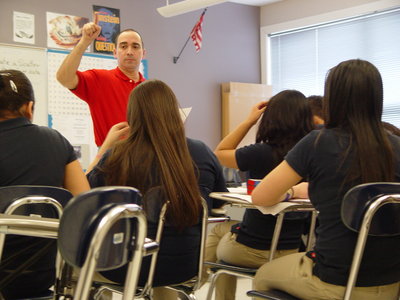When a student comes to Union City speaking no English – especially from a country where he lacked the basic schooling necessary to become literate in his own language, much less in math and science – it obviously presents a challenge.
“Our Port of Entry program addresses the needs of newly-arrived immigrant students with little to no formal education, interrupted education, or who never graduated from eighth grade in their native countries,” said POE Director Chris Abbato last week. He ran the same program in Elizabeth for 11 years until he took over Union City High School’s (UCHS) Port of Entry program in 1999.
“In some countries it doesn’t matter whether you go to school or not,” said POE English as a Second Language (ESL) teacher Laura Maczuzak last week. “These students then come here, and their age puts them in ninth grade, but their proficiency level puts them far lower.”
Port of Entry, then and now
Before the completion of the UCHS Academy for Enrichment and Advancement in 2009 on Kerrigan Avenue, POE classes ran two to a basement room in the Monastery apartments next to Union City’s Hudson Korean Presbyterian Church. The classes were separated by dividers and forced to compete for both audible and physical space.
“It was not a situation conducive to learning,” Abbato said, “but it was all we had at the time.”
One of those dividers now stands in POE Spanish teacher Angelina Martinez’s bright, window-lined classroom at the new academy on Kerrigan Avenue, as a reminder of how far the program has come.
For the second time in five years, UCHS’s POE program was recognized in December as one of the three best “newcomer” student programs in the nation. It was selected out of 63 other programs and detailed in a study by the Center for Applied Linguistics, funded by the Carnegie Institute.
Integration and tolerance
The choice to place the POE program in the same academy designated for the district’s highest performing students was deliberate, and has proved effective, Abbato explained. “Everyone works so well together,” he said. “The high-performing kids end up mentoring the POE students, who then are able to see what they could become.”
The academy also houses the district’s special needs and autistic students on the first floor. In a unique cycle of social responsibility and integration, they are frequently mentored by the POE students.
“The special education students come to our classes for socialization,” Maczuzak said. “It’s a mutually beneficial situation. This school is so unique because you just don’t see the kind of discrimination and lack of acceptance you see between students in so many other schools.”
“Their age puts them in ninth grade, but their proficiency level puts them far lower.” –Laura Maczuzak
__________
Hope for the future
Sixteen-year-old Reymis Geronimo is in his first year in the POE program, having recently moved to Union City from the Dominican Republic. His favorite class is math, but as he said in Spanish, “Todo me gusta;” or, I like every subject.
What he enjoys most about the program, he said, is, “Me enseña las cosas que no entiendo antes” – He’s able to learn the things he couldn’t understand before.
Reymis plans to study education in college once he graduates. For many students in his situation without a program like POE, even moving beyond a ninth grade level is a pipe dream.
Abbato reported that this year, the program has seen a 70 percent graduation success rate, after which POE students are integrated back into the regular UCHS curriculum when appropriate.
Like Reymis, 18-year-old Noel Velacquez arrived from the Dominican Republic speaking no English. A former POE student, he will graduate at the top of his senior class and is the commanding officer of the UCHS Jr. ROTC program. He plans to go on to study nuclear engineering in college.
How it works
Upon admission to the district, immigrant students of high school age are given language and academic subject proficiency assessment tests.
Criteria for entry into the POE program include the following: That there be a disparity between the student’s age and educational level, that they score below basic levels in their native language tests, and that they speak little to no English, among others.
They are placed into the POE program at the low, intermediate, or high proficiency level and take math, science, language arts, career exploration, and physical education in their native language, plus two ESL classes, until they meet ninth grade state academic requirements.
Once they do, they graduate from the POE program and move on. Students in the program range from age 14 to 17, so moving on may mean either transitioning into the high school, or into a GED program.
“I plan to retire here,” Maczuzak said. “It is a gift to see the most struggling student finally get it, and the self-satisfaction they have when they earn the right to move on.”
To comment on this story on-line, go to our website, www.hudsonreporter.com, and comment below. Gennarose Pope may be reached at gpope@hudsonreporter.com.
